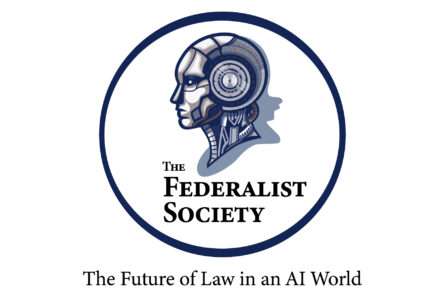

This sounds like an excellent symposium, with “contributions from lawyers, scholars, policymakers, and other experts on the myriad issues related to artificial intelligence and the law grounded in conservative legal principles.” You can submit proposals here. The topics they suggest (although it is not an exclusive list) are:
- Constitutional implications of artificial intelligence: Explore how the deployment and regulation of AI intersect with the fundamental rights enshrined in the Constitution.
- AI and property rights: Assess the challenges and innovations that AI brings to property rights, including intellectual property and data ownership.
- Artificial intelligence in the courts: The potential implications for due process, evidentiary standards and the broader justice system.
- AI ethics: Navigating the balance between individual freedoms, innovation, and the moral and social implications of artificial intelligence.
- AI and national security: Address the implications of artificial intelligence for our nation’s defense, surveillance, privacy, and cybersecurity infrastructure.
- AI and foreign policy: Understand the role of international law and the potential for collaboration or conflict with other nations in the governance of artificial intelligence and contemplate issues posed by international regulations, treaty bodies, trade and science policy, export controls and enforcement of intellectual property.
- The regulation of AI: Evaluate whether or not AI represents a new regulatory topic and consider state and federal regulatory approaches inclusive of innovation and liability for harms. Potential questions about how current state and federal regulatory regimes will promote or inhibit innovation or liability for damages and examination of alternative regulatory approaches. Discussion of the principle of federalism can be explored.
- AI and competition policy: As the concept of “big data” became popular, competitive advocates began to describe “data as the new oil.” We quickly learned that simply having lots of data isn’t enough to build competitive moats.
- AI and intellectual property: Examining existing uses of publicly available data for training large AI models and the intellectual property rights of those who want to control the works they own. Evaluate multi-party trade-offs and examine alternative regulatory regimes, which may or may not include new types of property rights.
- AI and the legal profession: Think about the different ways that AI can change the practice of law, whether with legal research, short writing, evidence, and how the judiciary can react to those changes. Additionally, an exploration of legal ethics, current regime or potential future regime for model rules of professional conduct. Other potential topics could include increased access to legal services and the existing impact on legal licensing or the legal profession.
Here are the sending rules:
Abstract
- Authors must submit an abstract of a total of between 250 and 500 words.
- Authors should include a short bio and contact information.
- Authors may submit abstracts for a maximum of three distinct topics.
- Individuals can be co-authors.
Final documents
- The works must be original and not previously published.
- Proposals must comply with the Bluebook citation system.
- Final documents should be between 10,000 and 30,000 words.
Key appointments
- CFP announced – Proposal submission is now open
- April 30, 2024 –Deadline for abstract submission (250 – 500 words)
- If your abstract is accepted, the final draft of your article will be delivered in September.
- June 1, 2024 – Notify me that your abstract proposal has been accepted
- September 1, 2024 – The final draft of your article must be considered for the award
- Early October 2024 – Symposium event
All contributions will be reviewed by our editorial board.
Benefits
- The authors will have the opportunity to present their works and participate That of the Federalist Society “The Future of Law in a Global Symposium on Artificial Intelligence.”
- Selected papers will be considered for publication in an academic publication, be it a law journal or journal.
- Excellent opportunities to network and build relationships with like-minded legal professionals, scholars and policy makers.
- Engage in meaningful discussions that shape the future of legal thinking on AI and the significant opportunities it may offer in the future.
- Based on the submitted documents, the editorial committee will select eight winners and eight runners-up from the thematic categories. Winners will receive a total prize of $7,500 each, while runners-up will receive a total prize of $2,500 each.
- The Editorial Board reserves the right to award more than two cash prizes for articles in categories.